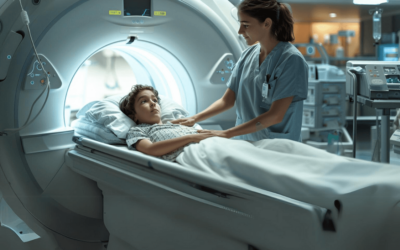Sheba Study Indicates: New AI System Can Detect Cancerous Biomarkers in Real Time
Over 1.76 million patients who suffer from non-small cell lung cancer (NSCLC) die each year because their condition was not detected on time. Data indicate that 10-20% of these patients die within 1-3 months after the diagnosis was made.
Detecting Biomarkers and Improving Diagnostic Capabilities
With the aim of addressing this critical issue, Imagene, a precision oncology diagnostics company, has developed an innovative AI-based imaging diagnostic system, which detects cancer biomarkers in real-time, significantly improving diagnostic capabilities.
The new platform uses the ALK and ROS1 genes as cancer biomarkers since, even though they are not prevalent in healthy cells, they are common in NSCLC cells.
In a new Sheba study recently published by the Modern Pathology Journal, clinicians have been tasked with assessing the efficacy and utility of the new system with an eye to its future deployment in the medical center for the benefit of patients.
Imagene’s AI technology was compared to conventional pathological cancer detection methods, including immunohistochemistry (IHC), fluorescence in situ hybridization (FISH), and NGS. Results indicate that among the 72 study participants, the platform validated the presence of both ALK and ROS1 biomarkers in 100% of relevant cases, and in 100% and 98.6% of respective ALK and ROS1 appropriate cases, with only one false-positive ROS1 detection.
The system has also demonstrated a capability to identify a spectrum of alterations, including mutations (e.g., EGFR), fusions, other structural variants (e.g., NTRK), differential gene expression (e.g., HER2), and cancer signatures (e.g., HRD).
These results represent unprecedented accuracy levels, comparable to current gold standard techniques, demonstrating the potential advantages that machine learning solutions may have in the molecular pathology domain by allowing fast, standardized, accurate, and robust biomarker detection.
As Imagene’s AI platform provides immediate results, it will enable much faster treatment for patients, who usually have to wait days for therapeutic intervention.
“Through ARC, Sheba’s innovation center, Imagene and Sheba have developed a close research collaboration in the field of biomarker detection, aiming to improve the quality of care received by cancer patients and save lives,” said Prof. Iris Barshack, Head of Sheba’s Institute of Pathology. “With the unprecedented accuracy levels indicated in our study, it is clear Imagene’s deep learning algorithms possess the potential to radically streamline cancer diagnosis and targeted therapy. We are committed to expanding this collaboration to cover more cancer types and biomarkers.”
As part of its ongoing commitment to advance care locally and globally, Sheba will continue promoting artificial intelligence based medical technologies.




